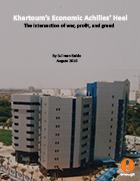
Note: This blog contains excerpts from the full report. Click here to read or download the full report.
In a new report released today, Enough Project Advisor Suliman Baldo describes the economic vulnerability of the Sudanese government, and why it opens a key window that gives the United States leverage to support a transition to peace in the country.
Khartoum’s Economic Achilles’ Heel: The Intersection of War, Profit, and Greed outlines how Sudan’s urgent economic crisis has caused sanctions relief to replace debt relief as the regime’s primary preoccupation, thus giving the U.S. government powerful leverage to support an inclusive peace deal in Sudan that leads to a transition to democracy. In a situation where grand corruption and mismanagement of mineral resources are among the key drivers of deadly conflicts in Sudan, understanding these economic vulnerabilities in greater detail can equip policymakers to better tailor their financial pressure measures to target top Sudanese leaders and their enablers, who orchestrate large-scale atrocity crimes and theft in Sudan.
TAKE ACTION:
Urge President Obama to Take a New Approach to Sudan Sanctions
When Omar al-Bashir seized power in 1989, the regime and its supporters began to dominate and extract wealth for themselves from the economy’s key strategic and high-value sectors, including the oil, transportation, communications, and construction industries. They also privatized state corporations, giving over the control of these entities to regime-affiliated businesses and charities, and began to operate many state institutions such as the National Intelligence and Security Services (NISS) alongside companies controlled by regime cronies. Through these networks, the Bashir regime effectively hijacked the national economy and exploited that power to generate benefits for themselves.
State-enshrined grand corruption, combined with economic mismanagement and short-sighted, opportunistic overspending of finite public money have left the regime heavily indebted, causing regime officials and their cronies difficulty in supporting the lavish lifestyles to which they have grown accustomed.
The Sudanese government now claims that U.S. sanctions have created the hardships that Sudanese people experience, minimizing the role they themselves have played in mismanaging the economy. They’ve wasted and abused resources, and diverted the Sudanese public’s money away from the productive and human development sectors—particularly agriculture, health, industry, and education—toward private accounts or to fund war against Sudanese citizens in peripheral regions. In addition to devoting a disproportionate share of the national budget to the military and security sector, the regime is also believed to run a covert budget which is not subject to oversight by government agencies. This covert budget is said to benefit interest groups close to the inner circles of power, and to equip the regime’s military, security, and police forces to better repress dissent and challenges to its authority.
The Sudanese government’s vast propaganda campaign has left significant multilateral actors without the leverage or political will that the United States is now in a unique position to deploy.
The report concludes with an acknowledgment and reminder that Sudan will be able to overcome its economic difficulties only when its government makes the welfare and development of its people its top priority. For that to happen, Baldo asserts, the regime has to be seriously and proactively engaged in diplomatic efforts for finding a just and lasting peace for the country with the participation and direct involvement of the opposition, civil society groups, communities affected by Sudan’s many conflicts, and all other stakeholders and actors with influence
Policy Recommendations
The Government of Sudan must:
1. End conflict. Facilitate a genuinely comprehensive and inclusive solution to end Sudan’s civil wars, and steer the country to a democratic transition.
2. Increase accountability. Fight official corruption, and introduce transparency measures. Give Sudan’s independent Auditor’s Chamber prosecutorial powers. Empower other accountability institutions, such as Sudan’s Chamber of Public Grievances (ombudsman chamber), according to well-established international standards. Reform the mandate, composition, and powers of the recently-formed National Anti-Corruption Commission in accordance with international standards and best practice.
3. Protect the independence of the judiciary and the media.
4. Support the tracing and return of stolen public funds.
Sudanese opposition, civil society, academics, and institutional reform experts must:
5. Plan for integration and reform. Work for better coordination and integration of ongoing initiatives for the development of alternative policies for the reform of the economic sector and other sectors vital for the stability of the state in the event of transition to democracy.
6. Research and document all stolen public funds and assets. Prepare plans for the recovery of these assets and for holding accountable those responsible for their diversion.
The African Union and the United Nations Economic Commission for Africa (ECA) must:
7. Support illicit finance investigations. Provide technical assistance to civil society efforts to enable them to identify, investigate, and document illicit financial flows from Sudan, in particular from the diversion of oil revenue. Then, enhance accountability by supporting efforts to recover such funds.
- Read or download the full report >
- Take Action: Urge President Obama to Take a New Approach to Sudan Sanctions >

